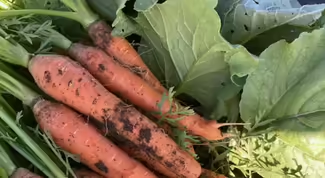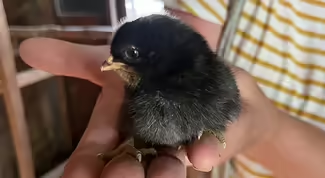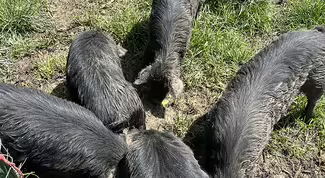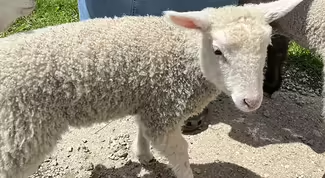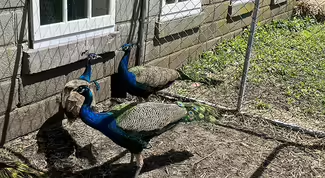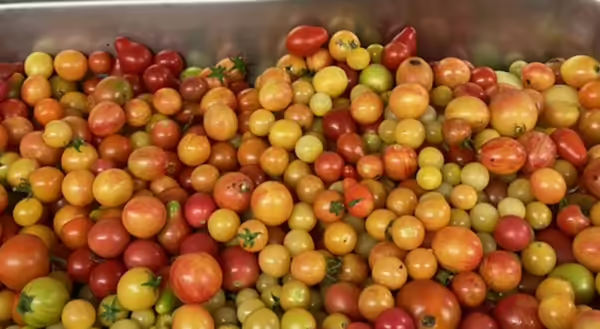
When I arrived at Garden Gate Farms in Fairbury, Illinois for another farmer interview, I immediately knew it would be a very interesting story. It was a cool spring morning, and I had my windows down. I’m glad I did. On the way up the driveway, I smelled freshly blooming lilacs, saw a handful of pigs in their pen, witnessed an army of vegetable transplants ready to be planted, and heard cows, chickens, and even peacocks! I stepped out of my car and was greeted by a large white Great Pyrenees named Libby, who vetted me thoroughly before allowing me to pet her. As I approached the farmhouse door, I quietly hoped that there would be time for a farm tour after the interview, to see what else was going on!
Beth and Doug Rinkenberger own and operate Garden Gate Farm, a rehabilitated 100+ year-old dairy farm they have turned into a diverse farm destination, just outside Fairbury. On their day off for the week, they had agreed to share their farm’s story. As most farmer interviews go, I was interested to know their backgrounds, how they came to learn and love farming, and the journey that led them to where they are today.
Humble beginnings
Doug grew up on his family’s dairy farm in Paxton, Illinois, and from an early age, helped wherever and whenever he was needed. “I was thinking about this right before you got here. I was 8 when I started helping my 55-year-old grandpa on the farm. And now I have an 8-year-old granddaughter who is helping me on my farm, and I’m 55!” said Doug.
I’m not from a farming background, so I’m always curious how those who are feel about their farm upbringing, looking back. “Oh, it was a bunch of work. We baled about 12,000 bales a year. The small ones though – which you can put out by hand. They call those idiot bales now because people think it makes more sense to use big bales for dairy cows. But we didn’t have a skid steer or any of the large equipment for large bales. We just did what we had to do.”
Beth grew up in Morris, Minnesota. Her dad started a machinery company called Superior Industries, which manufactures gravel processing equipment and isnow a well-known international firm. “I’m one of 7 kids, the oldest daughter of 5 girls,” Beth said. “Mom always had a big garden and canned whatever she could, and Dad dabbled in livestock.” Her father grew up “in town”, but he attended the School of Agriculture in Morris, so whenever he had any free time, he was “orcharding, messing around in the garden, and raising animals.”
From these backstories, it quickly became clear why Beth and Doug make a strong farm team. “How did you meet each other?” I asked.
“We met at a wedding!” answered Beth. It turns out that both were raised in the Apostolic Christian community. “One of the things people don’t know about the AC community is that we’re really well-traveled compared to other denominations of Christians,” said Doug. “We have fellowship gatherings around the whole country. Churches visit each other, we have interfaith friendships and fellowships – that’s all pretty common for us.” Doug happened to be at a wedding in Minnesota – the marriage of Beth’s cousin! Shortly after meeting each other, they were married.
In their first year of marriage, they lived in the small town of Cissna Park, Illinois. “That’s really where the roots of my farming career started to grow,” said Beth. She worked at Hart’s Greenhouse in Loda. “Gene Hart ran the shop and was an excellent mentor and teacher of horticulture, herbs, and flowers. That job fanned the flames of some ideas and got me into a farming mindset.”
Cissna Park to Fairbury, Illinois
In their second year of marriage, Doug got a job at Zimmerman Feed and Grain in nearby Forrest. In a short amount of time, Beth and Doug had four children, purchased and sold two small farms in the area, and finally ended up on their current farm in Fairbury. How they got to their current farm was an interesting tale!
“Well, one day, this place came up for auction,” said Doug. “We had known the farmers that worked and lived here,” added Beth. The farm was on the verge of reaching centennial status as it had been a dairy farm for almost 100 years. The property had enormous potential. Although the house needed work, they had kept the dairy barn in excellent shape. Doug ended up attending the auction and placing the winning bid. “I was the only one who wasn’t excited to go,” said Beth, “but I feel pretty good about our decision now,” she said with a smile. “I’m still trying to live that one down,” Doug added.
Asked about what had driven that spur-of-the-moment decision, Beth responded, “God’s will in our life plays a huge part. We were planted here, and we bloomed here! That’s how we see it. Doors have opened that we never would have anticipated. But that’s how it goes when you walk with a faith – you walk.” Doug continued, “When opportunity knocks, you jump on it, when something knocks at the door, you let it in!”
Sometimes, when I visit a farm, restaurant, or local business bustling with activity, it is hard for me to imagine that there was ever a quiet, humble beginning. Being at Garden Gate Farm, that’s exactly how I felt. So, what did the beginning of their farm look like? Listening to the response, I was transported back in time 20 years to the infancy of our region’s local food movement.
“About 6 months after we moved to this farm in 2009, I went to see Marty and Kris Travis speak about the Stewards of the Land.” Beth gave me the backstory of the group, which was the subject of the talk she attended.
Three small farms in the Fairbury area started collaborating with Dave’s Supermarket in 2004 to create a standing, indoor, self-serve, miniature farmers’ market. Dave’s assigned them a cooler the farmers could stock year-round with fresh, local, chemical-free produce from the farm partners as it became available. When customers purchased the produce, the farmers would earn some extra money without having to be present for hours at a time, like at a typical farmers market. Customers gained access to amazing locally grown food, and Dave’s made a little money too – a win-win-win situation. The effort was largely successful, and the group grew in membership.
With guidance from Spence Farm and input from their farm partners, Stewards of the Land LLC was incorporated in 2006 and began providing insurance and marketing support for its members. By 2008, the group had expanded to 20 farms and broadened their customer base. They were supplying to 5 regional groceries, 2 Champaign restaurants, 2 farmers markets, 20 CSA customers, and 8 Chicago restaurants, including Frontera Grill, the Girl and the Goat, Carnivore, and others.
“Doug and I thought what Marty and Kris were doing was great. Their members were harvesting or raising premium, sought-after items and bringing them to the Chicago chef scene and other direct market buyers once a week. At that time there was a huge market for local, unique produce in Chicago that just didn’t exist in Central Illinois cities, and it was good money for producers.” Chefs were requesting Spence Farm and other Stewards of the Land for items not available at the time or not available in enough quantity to satisfy demand.
“We knew we could grow some of those regularly sought-out items on our farm and try to meet that demand,” said Doug. In early 2009, Garden Gate Farm was born, and they joined Stewards of the Land. Doug started working the night shift at the feed mill. He would come home, plan and organize tasks for the girls to do, work until around noon, and sleep in the afternoon. “It was difficult, but it also allowed him to be home with our daughters every afternoon, which was special.” They began to steward and care for their new home, and their operation blossomed.
The first crops they sold were excess produce from their family garden, including multicolored carrots, green beans, heirloom tomatoes, peppers. What they couldn’t eat themselves, they sold through Stewards of the Land. “Everybody loves a tie-die tomato that was on the vine yesterday!” said Beth. Shortly after, tons of asparagus and rhubarb plants were added to the farm to meet the high and consistent spring demand for those crops in the following years. "You'll never believe what our first big-ticket harvest was on this farm,” Doug quipped. I made a few guesses, but none were correct. “Lambsquarters,” he revealed. “It grew everywhere on one side of the dairy barn. In Fairbury, that’s a weed, but in Chicago, it’s a delicacy!” I was later told they received $8 per pound for their lambsquarters. “We picked 40 pounds a week for the height of its season which lasts about a month, and pounds more over the years. I couldn’t believe it. But the demand was there.”
So, who wanted so many pounds of lambsquarters, and why?
As it turns out, Rick Bayless, an award-winning, Chicago-based chef and owner of several authentic Mexican restaurants, loved lambsquarters and still does! Of the few of us that know lambsquarters by name and appearance in the Midwest, most of us know it as a weed. However, in Mexican cuisine, it is a quelite. Quelites is a term that refers to a whole group of wild edible greens that are often used in authentic Mexican cooking. For Rick, this was a dream come true! Lambsquarters served as a good substitute for watercress, papalo, purslane, huauzontle, and epazote, which are often used in traditional Mexican recipes.
Experimenting with new crops annually can be a good thing, but if there is no market for them, even the most beautiful eclectic crop can end up as a loss on the balance sheet. A better way forward is to “ask chefs, customers, and grocery produce managers what they want – “what they would love to have but can’t get!” said Beth. “That way, no matter how little or how much you can harvest, they’ll typically take most if not all of it, week after week!”
An example for Garden Gate Farm this year is Biquinho peppers. The name Biquinho means "little beak" in Portuguese. Biquinho peppers are sweet, tangy, and smoky with a bit of heat, and have a tropical fruity flavor. Beth shared, “I had a chef who asked me to grow these peppers specifically. It’s the best case for us because we know we’ll have a buyer. Much better than experimentation and just hoping the experiments will sell.” Custom growing like this can demand a premium price. “Plus, you don’t know when packing up for a market how much of your produce you’ll come back with. When we sell these peppers, they’re sold – end of story.”
Doug and Beth’s four daughters – Abby, Carrie, Cassie, and Brianna – began working on the farm as soon as they were physically able. But as the years passed, they started considering part-time summer and afternoon jobs in town. Their parents favored an alternative path.
Beth explained, “we really wanted our girls to learn farm skills, and we wanted to pay them what they could make in town.” This spurred the couple to pursue additional opportunities to add diverse production capacity to their farm, “so that there would be enough for them to do!” said Beth. The girls learned animal husbandry, gardening, electrical work, plumbing, and mechanics, among other skills, by working as Garden Gate Farm’s only employees. All the Rinkenberger daughters possess a strong work ethic that was developed on the farm.
In the farm’s first year, they experimented with a small CSA component of their farm business, “and the girls helped with that,” said Beth.
In 2010, Garden Gate Farm received a surprise “boatload of turkeys” as described by Doug. He elaborated, “First thing we did was put them out on pasture. They were hens, which don’t yield as many pounds of meat at harvest as toms. Someone from the feed mill I worked at asked me if I knew anyone who wanted a bunch of hens for a bargain; I said we’d take them!” The girls went on to raise the birds on pasture with a non-GMO diet. They sold most of those turkeys by Christmas that year, so they got more the next season – this time toms. “Our girls ended up becoming basically small turkey farmers!” exclaimed Doug. Year after year, their broad-breasted white turkeys have been popular, not only in Chicago but now Bloomington, Champaign, Peoria, Springfield, and elsewhere. Beth and Doug discovered that no one in the area was producing pasture-raised turkeys for the Thanksgiving table, which has now become their main livestock product.
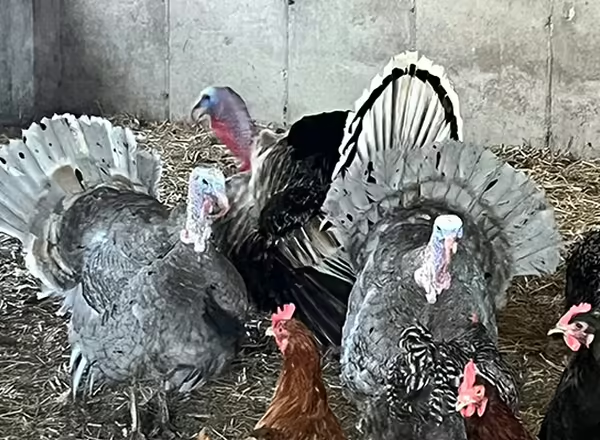
The 2024 complete product offerings of Garden Gate Farms change throughout the year and are too diverse to list here. However, they have their core income drivers, like everyone else. Doug listed them off for me. “Primarily we now grow asparagus and rhubarb, herbs, hearty greens like Swiss chard, sorrels, etc., heirloom multicolored tomatoes, edible and decorative flowers, root vegetables (beets, radishes, carrots, potatoes), and turkeys”.
Beth and Doug, managers of Garden Gate Farms, now have two small pieces of property located near each other. These properties are used for their diverse agricultural production, side-project crops, livestock, and experiments. Doug estimates the total area under cultivation for both properties is a little over an acre. “I know it doesn’t sound like much,” Doug said, “but if you use it well, an acre or acre and a half can provide a LOT of food. We don’t need any more than that – it keeps us busy enough!”
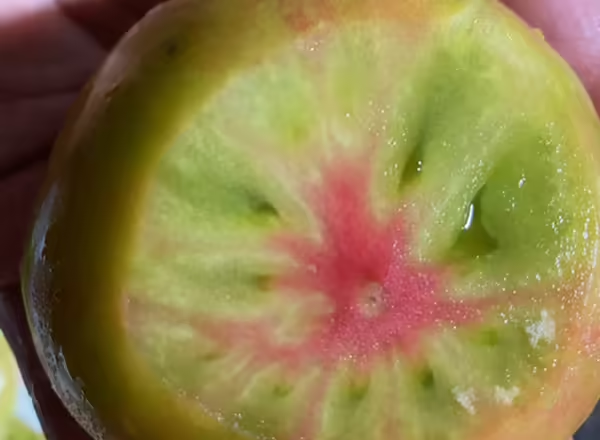
I wanted to know from Beth and Doug’s perspective what they thought the biggest challenges are for farmers like them in Illinois who are managing diverse production systems on small acres. “Land access – whether you’re looking to add just an acre or two to an operation like ours or start something similar – is top of the list for sure. Everybody knows everybody in the rural areas, small acreage parcels rarely make it to the open market and that’s especially true with 5–10-acre farms with a livable home,” said Beth.
“Once we found our chef market in Central Illinois cities and in Chicago, our sales became more regular, which was encouraging. However, we’d love nothing more than to feed our more local community members, so if anybody is ever interested, they can always contact me or Doug, or go check out items at Dave’s Supermarket,” explained Beth.
That led me to the most interesting aspect of the Garden Gate Farms strategy: cultivating their buyer network and managing their distribution system.
Although Garden Gate Farms initially sold their products through Dave’s Supermarket in Fairbury, they quickly discovered they had eager customers willing to pay top dollar not only in Chicago but also in nearby mid-sized cities. As they enter their 9th full-time farming season, this trend has only continued to grow – and now they even deliver to driveways! By 2015, the farm was financially stable enough to support full-time farming. “Up to this point, we were still part-time, and Doug was still working nights,” Beth reminded me. “Demand for our products kept growing, and we came to a fork in the road. We had to figure out how to balance family life with farm business possibilities and trajectories. Doug “retired” from the feed mill and began working full-time on-farm, to be better able to tailor our product and product delivery options and experience to meet our customers’ needs,” clarified Beth.
Little did they know they had begun a component of their business that would only grow in popularity.
“Then during the pandemic, a lot of people weren’t going anywhere. Many city residents felt uncomfortable at grocery stores, and they needed food! We were already delivering to restaurants and grocery stores, and we discovered we could add some home delivery drop-offs without much additional hassle.” Beth added that as some families began taking advantage of this service, news of its availability spread. “Many families ended up on our list through word of mouth, and now that the pandemic is over, the majority of them have stuck with us because they still love the convenience of farm-fresh products dropped at their door.”
I then asked for a deep dive into the logistical details of what a typical farm delivery week is like.
About 3-4 days before each delivery, Doug sends out a list to buyers via email of what he’ll have available that week. Each item has a unit description (lbs, oz, containers), and price per unit. Most of the products on the list are from Garden Gate Farms. They have started carrying dairy, meat, and grain options from other farms to offer their customers a wider variety of products. Buyers have until about 36 hours before their city’s delivery day to email back with their desired items and quantities.
Monday is preparation day for Chicago deliveries on Tuesday. Items are harvested, cooled down, boxed, and labeled for the next day. Doug usually delivers to 5 or 6 restaurants and up to a dozen Chicago households depending on the week. “Wednesday is our day off” says Beth. Though they usually have multiple grandchildren in their care that day, Wednesdays are for refueling and for family. Thursday is prep day for Friday deliveries to the south. Fridays, Doug makes deliveries in Springfield to restaurants and homes, then continues to St. Louis to deliver to several chefs and homes. Doug also makes deliveries to customers in Troy, Missouri twice a month. Recently, Garden Gate Farms has found enough demand from buyers in Quincy, Illinois to add bi-monthly visits, on top of everything else – and it’s been worth their while.
Doug replied, “Quincy drop-offs are getting to be an average of 3 restaurants and 7 home deliveries.” “Quincy has been great for us,” added Beth.
Depending on the season and available crops, Peoria, Champaign and Bloomington appear occasionally on Doug’s list!
To me, this sounded like a big logistical hassle, but Doug and Beth assured me that the faithful and relatively consistent buying power of their delivery customers made it worthwhile. They have been trained to value freshness, quality, and personal relationships with their farmers. “We charge what we charge because up until about 24-36 hours before delivery, their milk is still in the cow and their eggs are still inside the chickens. In places all over the state, some people will pay for that –sometimes quite a bit!”
I’ve heard speakers such as Rick Bayless at the Everything Local Conference, and many others tell similar stories. When the carrot just came out of the ground the day before, when the lettuce head was harvested 2 hours before CSA pickup, and when customers can taste something is truly fresh in ways they just can’t experience from traditional grocery store items, it’s hard to put a value on that. With that in mind, I wanted to know what practices Garden Gate Farms uses to maintain the freshness of their produce. “Cool it down, ASAP,” replied Doug. “Simple as that. I collect coolers now specifically for this purpose. Get the heat out of it, get produce chilled properly and it will keep for weeks and still be very fresh.”
“What keeps you going when you encounter challenges on the farm or in your day-to-day?” I asked Beth and Doug. Doug replied first. “When you have your back to the wall, you must keep going until you get it done. When you tell people that you’re going to do something, you do it.” Beth had a great answer as well. “I think that the thing that most keeps me going is the satisfaction of knowing that we are helping other people and inspiring other people. We share this farm with many, especially children!”
“What excites you both going into your 9th full-time farming season, and what do you look forward to?” I asked.
Beth answered, “we are always trying lots of different things. Sometimes they work and sometimes they don’t. But we like experimenting with new crops and processes yearly, and to me that’s some of the most exciting stuff.”
“When the grandkids show up, what’s new and exciting to them is what is most exciting for me. Grandkids picking the asparagus excites me.” Beth and Doug shared that they now have 8 grandchildren, with a 9th and 10th on the way!
“What can we at IL Extension do – if anything – to help small farms like yours reach their goals?” I wondered. “We are honestly pretty self-sufficient,” said Doug. He said that local help is their first line of defense. “We all know each other out here and we all help when asked. For example, Dave’s Supermarket called me last year and said they had a pallet of raspberries that were a few days away from going bad, and did I know anybody that could use them? I picked them up, covered Dave’s costs, and instead of them going to a landfill, sold them for a small profit to Corey Mason’s meadery called Tree Hive in Brocton, IL. Corey always wants fruit for mead – he was thrilled. When we’re not getting each other out of messes, we’re looking out for each other like that. We really value the connection with our friends and neighbors.”
Beth shared, “I think new farmers can greatly utilize Extension – that’s what I see as one of Extension’s strengths. We’ve got our processes mostly figured out. I will say that the soil solarization weed control strategy you taught us last year greatly reduced our weed pressure in our fall carrot crop. Those carrots were a hit at the Springfield holiday market we attended. I think that kind of applied field research and testing of methods with growers has helped us and could help many others.”
I wanted to know what advice Beth and Doug would give to young people today who are interested in getting into farming, either on a homestead scale or as their part-time or eventually full-time jobs.
Beth had some very insightful advice to share: “They need to make sure they can find somebody they can work with and learn from before going off on their own. Making sure to go and work on not just one but several farms could really cut down on the learning curve. Learn how to do things and how NOT to do things. Startup farmers need experience and need to learn by doing. You can’t watch a YouTube video about something and know it.” She also revisited the concept of producing a niche crop that has been identified as in-demand for an area where that niche is not being filled.
Buyer education and relationship; and agritourism
I asked if there was anything I missed that either of them wanted our readers to know. “Farmers are let off the hook a lot for this but it’s important – they need to educate their buyers! Chefs need education, the grocery store manager and produce manager need education, and on. You’re not getting local carrots with tops intact in February – not from Illinois! Tomatoes aren’t ready until July, etc. Don’t judge your customers for not knowing these things. It’s an opportunity to strengthen your relationship with your buyers.
“For us, our favorite form of education is having chefs, regulars, and first-time buyers out to the farm. Agritourism is our preferred way to show anybody that wants to know how things are done here.” I added that chefs probably have a better experience with Garden Gate Farms products on-farm, not only because it is fresher than when they get it, but because they’re away from their loud, hot kitchens!
With the interview concluded past the agreed time, I was very happy that my hosts were willing to show me around the farm anyway. After witnessing the eye-popping abundance of livestock, fruit and vegetable production, boarded beef cows of a friend, and much more, I drove home thinking about the importance of relationship-building. Their customer base, the local food movement in Illinois, and those who read these Extension articles are all the result of that process. My takeaway was: always strive to develop strong relationships with those you interact with because you never know what opportunities they may lead to.
